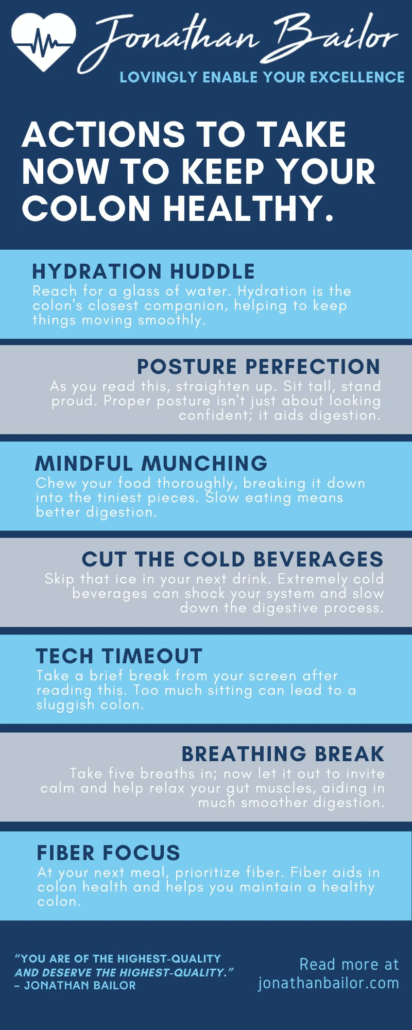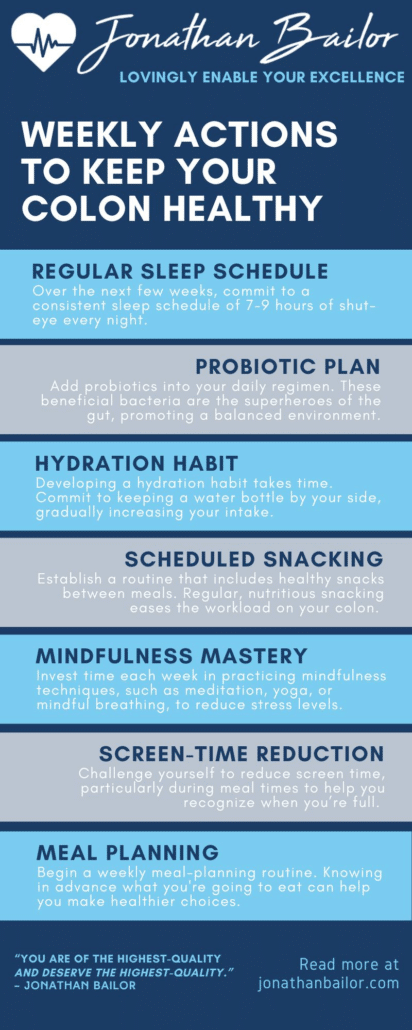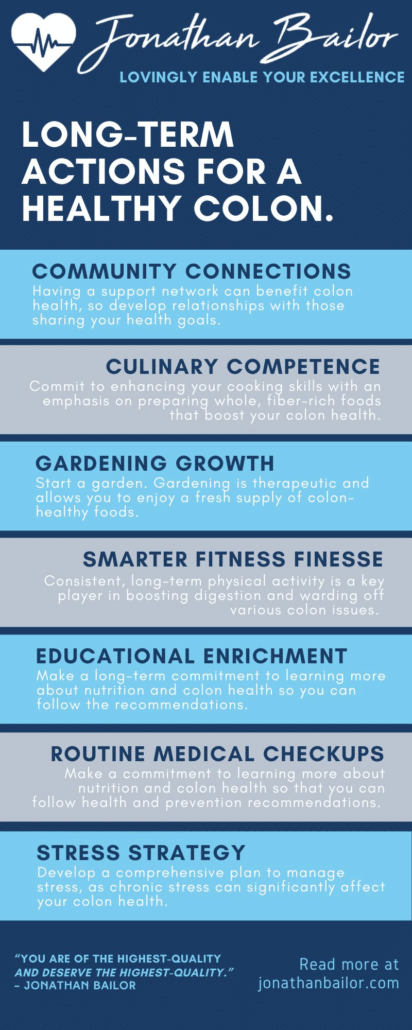21 Tips for Keeping Your Colon Healthy at Every Age
Navigating the twists and turns of maintaining colon health can seem daunting. But what if you were handed a map with the wisdom to guide you through every stage of life? That’s exactly what you’ve found here, ways to keep your colon healthy at every age. This isn’t a list of rigid directives; it’s a conversation, a shared cup of tea where we talk about the simple yet powerful habits that can keep your colon content from your vibrant 20s to the golden years beyond 50.
Take care of your colon with our 20 Easy Daily Habits to Enhance Your Colon Health and Your Guide to 28 Evidence-Based Treatments to Enhance Lower Colon Health guides!
Think of it as nurturing a garden. Whether you’re planting new seeds or tending to a lush, established bed, each season has its own needs. The same goes for your colon health. And fear not, these habits are easy to digest (pun intended), tailored to fit into your life like the perfect pair of comfortable shoes. They’re designed to resonate with a fresh-out-of-college adult, a busy midlife parent, and yes, even if you’re enjoying the adventure of post-retirement.
They can also help ensure your colon is healthy, reducing your risk of developing colon cancer, inflammatory bowel disease, and other colon-related issues.
Let’s create a circle of health with Jonathan Bailor, beginning with you and extending to everyone you hold dear. By sharing these wellness gems, you’re not just passing on advice but showing you care. Let’s embark on this journey together, fostering a legacy of health that will last a lifetime. So, grab a glass of water (your colon’s favorite beverage), settle in, and let’s dive into the habits that will help you keep your digestive garden flourishing.
Immediate Actions to Keep Your Colon Healthy
1. Hydration Huddle
Right this second, reach for a glass of water. Hydration is the colon’s closest companion, helping to keep things moving smoothly. Aim to sip slowly; by the day’s end, you will have met the quota of eight glasses. Your digestive system will benefit from increased fluid intake, facilitating the movement of food through your body.
2. Posture Perfection
As you read this, straighten up. Sit tall, stand proud. Proper posture isn’t just about looking confident; it aids digestion. Slouching can compress your gut, leading to slowed digestion. A straight spine is the secret to a streamlined digestive tract.
3. Mindful Munching
Eating for a healthy colon is as easy as chewing. Begin with your next bite. Chew your food thoroughly, breaking it down into the tiniest pieces. This makes digestion easier and allows your colon to extract nutrients efficiently. Slow eating also means better digestion, less bloating, and an appreciation for your meal’s flavors.
4. Cut the Cold Beverages
Skip that ice in your next drink. Extremely cold beverages can shock your system and slow down the digestive process. Opt for room-temperature water to maintain a steady and friendly environment for your colon.
5. Tech Timeout
Take a brief break from your screen after reading this. Too much sitting can lead to a sluggish colon. Stand up, stretch, and take a quick stroll around your space. Regular movement, even in short spurts, can encourage a healthy digestive rhythm.
6. Breathing Break
Take a deep breath in; now let it out. Stress tightens the whole body, including the digestive system. Introduce a simple breathing exercise right now, perhaps five deep breaths, to invite calm and help relax your gut muscles, aiding in smoother digestion.
7. Fiber Focus
At your next meal, prioritize fiber. Fiber aids colon health. An immediate increase in fibrous foods like low-sugar fruits, such as blueberries, and nonstarchy veggies, such as Brussels sprouts, can help form soft, bulky stools, which are easier for the colon to eliminate. High-fiber foods help you maintain a healthy colon.

Feeling Better Is Priceless, That's Why We Don't Put A Price On It!
“It’s Like A Free and Medically Valid Version of Noom and Weight Watchers Online”
~ Dr. Doctor Matthew Oleshiak, MD
Click the 'LEARN MORE' button below for free lifetime access to the fast fix program developed by Jonathan and top Ivy League Medical Doctors
LEARN MOREP.S. It's not a free trial. It's not part of the program for free. The entire program is free, forever, for real! No credit card needed.
Mid-Range Measures: Weekly Wins to Keep Your Colon Healthy
1. Sleep Schedule Maintenance
Over the next few weeks, commit to a consistent sleep schedule. Quality sleep is not just about feeling rested; it’s a time for the body to repair and regulate itself, including digestive processes. Aim for 7-9 hours of shut-eye, letting your body establish a rhythm that supports a healthy colon.
2. Probiotic Plan
Introduce probiotics into your daily regimen. These beneficial bacteria are the superheroes of the gut, promoting a balanced environment. Whether through a supplement or probiotic-rich foods like yogurt or kefir, consistent intake can support the colon’s ecosystem over the weeks.
3. Hydration Habit Building
While immediate water intake is crucial, developing a hydration habit takes time. Over the coming weeks, make it your mission to keep that water bottle by your side, gradually increasing your intake until it becomes second nature to sip throughout the day.
4. Scheduled Snacking
Establish a routine that includes healthy snacks between meals. Regular, nutritious snacking can keep your metabolism steady and prevent the overloading of your digestive system at meal times, easing the workload on your colon.
5. Mindfulness Mastery
Invest time each week in practicing mindfulness techniques, such as meditation, yoga, or mindful breathing, to reduce stress levels. Consistency is key to preventing gut inflammation and overactivity.
6. Screen-Time Reduction
Challenge yourself to reduce screen time, particularly during meal times. Over the weeks, this practice can help you become more aware of your eating pace, chew food thoroughly, and recognize when you’re full, all of which benefit colonic health.
7. Meal Planning
Begin a weekly meal-planning routine. Knowing in advance what you’re going to eat can help you make healthier choices and ensure you’re getting a balanced diet rich in nonstarchy vegetables, nutrient-dense proteins, and whole food fats, which reduce hunger and the temptation to opt for processed foods that can disrupt colon health. In addition, fruits and nonstarchy vegetables contain natural cancer-fighting compounds that may help prevent colon cancer.

Sustaining Health: Long-Term Commitments for a Healthy Colon
1. Community Connections
Building a support network can have surprising benefits for colon health. Over the months, cultivate relationships with individuals who share your health goals. Such connections can provide encouragement, share insights, and foster a sense of accountability that reinforces your dietary and lifestyle choices conducive to a healthy colon.
2. Culinary Competence
Commit to enhancing your cooking skills with an emphasis on preparing whole, fiber-rich foods. As the months progress, homemade meals can become a foundation of your diet, allowing you to control ingredients, avoid preservatives, and include colon-friendly foods like leafy greens, nuts, seeds, and legumes. Maintaining a healthy colon also means limiting the consumption of red and processed meats, which you can easily do if you add plant-based foods to your meals.
3. Gardening Growth
If possible, start a small garden. The act of gardening itself is therapeutic and fosters a connection to the earth. At the same time, the long-term benefit of harvesting your own vegetables and herbs ensures a fresh, organic supply of fiber and nutrients to support a healthy colon.
4. Smarter Fitness Finesse
Ease into a fitness routine that emphasizes eccentric movements, the art of extending muscles, particularly during the lowering phase of an exercise. This approach, focusing on the eccentric, provides significant metabolic benefits. Don’t forget to also lace up for a stroll or enjoy a leisurely bike ride as part of your daily routine. Consistent, long-term physical activity is a key player in boosting digestion and warding off colon issues. It’s all about increasing blood flow and fostering regularity in your body’s natural processes.
5. Educational Enrichment
Make a long-term commitment to learning more about nutrition and colon health. By expanding your knowledge through books, courses, or seminars, you can gain the ability to make informed decisions about your health and keep abreast of new findings and recommendations.
6. Routine Medical Monitoring
Establish a routine of regular medical check-ups, including colorectal cancer screenings, as recommended. Over time, this will not only help in the early detection of colon cancer and other potential issues but also give you a clear picture of the state of your colon health and the effectiveness of your lifestyle changes.
7. Stress Strategy
Develop a comprehensive plan to manage stress, including advanced techniques like cognitive-behavioral therapy or professional counseling if needed. Long-term stress management is crucial, as chronic stress can significantly affect digestive and colon health.

Frequently Asked Questions on Keeping the Colon Healthy
Q1: What are common signs that may indicate a lower colon health issue?
Common signs of lower colon health concerns can include changes in bowel habits, like chronic constipation or persistent diarrhea, abdominal pain, blood in the stool, unexplained weight loss, and a feeling that your bowel does not empty completely. These symptoms should be taken seriously, and a healthcare provider should be consulted for a proper assessment and diagnosis.
Q2: Can diet really make a difference in maintaining lower colon health?
Diet plays a pivotal role in lower colon health. A fiber-rich diet of fruits and nonstarchy vegetables promotes regular bowel movements and can prevent constipation. Staying hydrated is also essential, as water works with fiber to smooth digestion. Reducing the intake of red meat and processed foods can also be beneficial, as they may be associated with an increased risk of colorectal cancer.
Q3: How often should one undergo colon screening?
Screening frequency depends on individual risk factors, but generally, it’s recommended that people at average risk start regular screening at age 50. Those with a family history of colon cancer or other risk factors may need to start earlier. Screening methods vary, and options can include colonoscopy, stool tests, and flexible sigmoidoscopy, among others. Discuss with your healthcare provider which screening schedule is best for you.
Q4: Are there lifestyle changes that can help protect the lower colon?
Yes, in addition to dietary changes, regular physical activity is associated with a lower risk of colon cancer and helps maintain a healthy digestive system. Avoiding tobacco and limiting alcohol consumption can also reduce the risk of colon cancer. It’s important to listen to your body and respond to its needs—adequate sleep and stress management also benefit overall colon health.
Q5: What role does the microbiome play in lower colon health?
The microbiome, consisting of trillions of bacteria living in your colon, is essential for many aspects of health, including digestion, nutrient absorption, and immune function. A diverse and balanced microbiome is linked to a healthier colon. Probiotics and prebiotics can support microbiome health, and a varied diet rich in fiber is one of the best ways to nourish a healthy gut bacterial community.
A Gentle Reminder for Collective Well-being
As we close this chapter on lower colon health, remember that knowledge is most powerful when shared. Each stride we make towards wellness can inspire those in our circles. So, don’t keep these insights to yourself—spread the word! Share this guide with friends and family through social media or a caring email. Imagine the ripple effect of health and vitality that you could initiate, one click at a time. Let’s nurture our health together and build communities where well-being is a shared journey. Your voice matters—let it echo with purpose and positivity.
Feeling Better Is Priceless, That's Why We Don't Put A Price On It!
“It’s Like A Free and Medically Valid Version of Noom and Weight Watchers Online”
~ Dr. Doctor Matthew Oleshiak, MD
Click the 'LEARN MORE' button below for free lifetime access to the fast fix program developed by Jonathan and top Ivy League Medical Doctors
LEARN MOREP.S. It's not a free trial. It's not part of the program for free. The entire program is free, forever, for real! No credit card needed.




